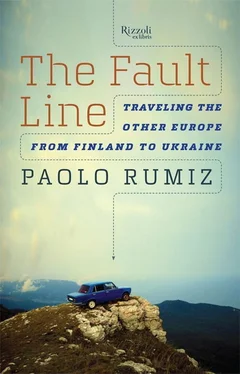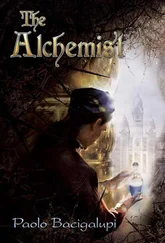Oleg: “You’re a wise man. I could see that as soon as you came into view, from the way you were walking.” They say things like that in Russia. They put their heart in your hands right off the bat. One time in Italy, on a train, I met an elder caregiver from Smolensk who, after five minutes of conversation, asked me if I was happy. It wasn’t just formal curiosity; she really wanted to know. Obviously, it had been years since anyone in Italy had asked me a question like that.
Velikaya Guba is a forgotten piece of old Russia on the shore of Lake Onega. Having grown up around the dock for the ferry to Petrozavodsk, today it is a small conglomeration of colored izba s, together with the remains of an old sovkhoz (expropriated Soviet farm), a country library with the samovar always on the stove, an alarming monument to the Soviet heroes from the secret services, and a small psychiatric hospital, which may have had some connection to the KGB.
Next to a small food store, the magistrate picks up a young boy who knows how to get to where we’re going and takes us on a dirt-road roller-coaster ride all the way to our destination, a solitary heath on the lake, surveilled by skeins of chaika s, the seagulls with a supernatural squeal, immortalized by Chekhov and unbeatable in vertical diving. Nothing at all to do with our marauding omnivorous seagulls. The chaika is a genteel beast that flies light, like the Holy Spirit, and certainly symbolizes it much better than the dove, unworthily promoted by theologians to the rank of God’s bird.
By now it’s eleven o’clock, and it’s frigid, but Mariusz and Natasha’s house, next to the chapel of Saint Simon, is burning in the evening sunlight. The Northern sky is like that: when it catches fire, it repays you for all the gray it has afflicted you with for days, weeks, or months. The chimney is smoking, so there must be somebody home. We bid farewell to the judge, but before he goes, Oleg makes us a present of a bottle of the elixir of Onega as a down payment on an invitation to his house for dinner in the next few days.
Now we’re on our own in the wind. The “burning” house creaks, wind gusts whistle through the cracks, and as it opens, the front door sounds a long lament like a boat in a raging sea. I make my way forward, tottering on the loose boards of the most dilapidated entryway I’ve ever seen, and knock on the door, to my left, of what I imagine is the kitchen. It feels like a ghost house, but no, the odd couple is there, just finishing their candlelight dinner. Blond Natasha Vladimirovna, sitting next to the pechka , the wood-fired stove with a crackling fire, invites us in with a big smile. To get to know a man of the North, you have to understand his house, but since the heart of the house is always the pechka , the fire is always where you start. Next to the fire is where you are born and where you die. Around the fire is where encounters are sealed.
Mariusz struggles to come out of his wolf-man silence, and then he loosens up and talks. The stove is big, six feet by nine, as tall as a man, and is always in the “women’s corner.” The pagan idol stood there, in the feminine heart of the house. That’s where offerings were made. But when Christianity arrived—a late discovery for the Russians—it became the “impure” corner and, in contraposition, the corner opposite the fire came to be known as the “holy” space. The religious icons were placed there. The izba is a concentrate of symbols.
The ceiling is a blend of soot and larch-wood resin where once the stars were painted, while the tree trunk at the apex of the roof is the Milky Way. The izba , therefore, is a representation of the cosmos in a world where until yesterday a shepherd was before all else a medium, someone able to interrogate the great silences of nature.
It’s midnight, and the horizontal sunlight, doubled by the reflection off the lake, fills the house, enters even into the mouth of the pechka , as though to light the fire. It’s something inconceivable in the Mediterranean world, a sacred mystery that Sergei Yesenin described better than anyone and that Mario Rigoni Stern, author of The Sergeant in the Snow , discovered to his amazement in 1943, on the front of the river Don. But it is only the beginning of the journey into a blazing constellation of symbols, which only now, after millennia, are losing their meaning and are calling for a poet to ensure they will be remembered. As Wilk tells it, “At the moment of birth, the door of the pechka was opened to propitiate the passage of the newborn baby, and if some burning coals fell out, they were gathered up to prepare an infusion for the mother.” When the baby was born, he or she was placed immediately on a mattress on the roof of the stove-mother, cozy nook and perfect reproduction of human warmth. It’s made of clay, the same biblical paste from which humankind was fashioned.
The idea that all of this is being lost deeply concerns Mariusz and Natasha, and they feel they have been called to a mission to save it. She has opened a school of weaving and traditional cooking in Velikaya Guba. He focuses on this age-old heritage in his writing to save it from oblivion. The Pole has now definitively come out of his diffidence and is talking in torrents. “By now almost no one lives here on a permanent basis. The lake has become a vacation spot, and the people have all bought Canadian woodstoves. The Russians are losing their memory of what it meant to spend a winter on a Russian stove. You know, when it’s forty below, you can sleep naked on top of the stove. Every now and again you go out, make a hole in the ice, pull out a bucket of water and take it home. That’s the extent of your relationship with the outside world. You’re hungry? Make a hole in the ice and fish. Have a fever? You treat it with a wet blanket and juniper branches covered with berries. There’s talk of a certain Ivan who never left his bed on the pechka all winter long, not even if he was summoned by the czar.”
Now the lake is bristling from the Arctic wind. The sunlight has turned metallic.
Mariusz: “The season is behind, but that’s better for you two; there aren’t any parmak s.”
I ask if he’s referring to neighbors.
“No, they’re enormous flies with monstrous eyes. If they bite you, you’re cooked. They only live for ten days, but those ten days are frantic. They take aim at you from miles away, come at you like a cloud, and throw themselves at every part of your body that you’ve left uncovered. If your horse gets bitten, he goes wild with pain and there’s no way you can control him. Those flies are bloodthirsty. They call them the locusts of the North.”
There’s a leather shaman’s mask on the wall, called a skoromokh . Wilk puts it on and imitates the sound of the wind. Karelia is drenched with paganism, and the Christian world has rather precariously superimposed itself on it with its own array of icons, incenses, and tenebrous chants, also drenched with magic. All around the lake, the shields of granitic rock, smoothed and scratched by countless glaciers, are full of prehistoric graffiti: salmon, swans, beavers, geese, ducks, bears, reindeer. “There’s a hunter on skis, bow and arrows in hand, chasing after a reindeer. They could be the oldest skis ever represented by man,” Wilk observes. “But the most moving image is the one of a Great Mother, traced around a fissure in the rock in the position of the vagina, the barycentric symbol of Earth’s fertility. Christianity—just imagine!—interpreted it as a sign of the devil, and carved a cross over that sinful body. It’s not hard to understand why the Karelians were fiercely hostile to the first evangelizers.”
Читать дальше












